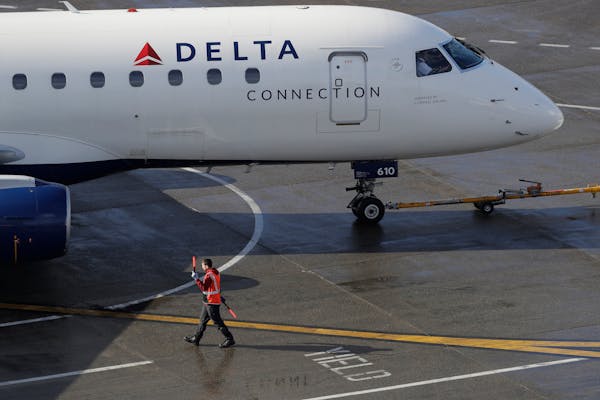Flight attendants at Endeavor Air, a Minneapolis-based regional carrier, are increasing pressure on parent company Delta Air Lines to end a tiered payment structure and increase their wages to more closely align with what Delta pays its mainline workers.
Endeavor Air is a wholly owned subsidiary of Delta doing business as Delta Connection. Regional carriers like Endeavor often fly routes to smaller markets on behalf of the major U.S. carriers, like Delta, American and United airlines.
So far, Endeavor flight attendants have picketed outside Hartsfield-Jackson International Airport and Delta headquarters, both in Atlanta, and recently sent a letter addressed to Delta chief executive Ed Bastian demanding wage increases.
Endeavor's flight attendants, represented by the Association of Flight Attendants-CWA, or AFA-CWA, the nation's largest flight attendant union, are now circulating a petition to gain public support and bring more attention to their wage increase request.
"What our ultimate goal is is to get Delta to step up and to treat us fairly," Endeavor AFA president Tim Kipka said.
To bring about that outcome, their current contract with Endeavor's management would have to be amended. Endeavors' AFA officers can agree to a new pay scale without it being voted on by Endeavor's flight attendants as a whole, Kipka said.
"They could come tomorrow and say 'Here's a new [higher] pay scale,'" Kipka said. "I bring it to my officers, we say 'yea' or 'nay' and boom, whatever effective date is on that becomes the effective date. Realistically, a couple of hours and you could solve this problem."
Endeavor's flight attendants negotiated a five-year contract with airline management in 2020. It was extended two more years in 2022 along with a 4% wage increase. The deal includes a 1.5% rate increase each following year through 2027.
The flight attendants received their last contractual 1.5% raise on April 1.
Despite the recent wage increase, Kipka said, Endeavor's flight attendants are receiving wages that are on average 45% less than the airline's mainline flight attendants. The starting hourly wage for an Endeavor flight attendant is $25.46. With a monthly-hours guarantee of 75 hours, that comes to $22,914 a year, he said.
"The average passenger doesn't know that if they're flying from, say Duluth to Minneapolis to L.A., that the first flight oftentimes is on Endeavor," Kipka said. "They're getting the same level of service, but we're compensated about average about 45% less. [The passenger] didn't get 45% less of Delta."
In an emailed response to the Star Tribune, Delta defended its track record of providing "industry leading compensation" to its workers, but also said because the flight attendants are employed by Endeavor and represented by AFA, "details related to pay and working conditions should be discussed and addressed between Endeavor and AFA."
Endeavor's management argues its current contract with its flight attendants is at the top among regional carriers.
"Endeavor and the AFA negotiated the current contract and it was approved by the majority of flight attendants who voted on it," Endeavor Air spokesperson Katharine Tinucci said. "This contract is in effect through March 31, 2027, and it offers a total compensation package that is in the top-tier for the regional airline industry."
Endeavor employs about 1,600 flight attendants nationwide, with about 10% based at Minneapolis-St. Paul International Airport. More than 40% are based in New York, one of the airline's hubs, Kipka said, and a little more than half of those flight attendants were hired in the past two years.
Dan Akins, an aviation economist at Flightpath Economics, said the business model behind major airlines owning regional carriers is outdated. Regional airlines used to bid against each other "to see who could offer the lowest, most aggressive cost to mainline carriers," making themselves available as an outsourced, lower-cost operation with lower-paid workers.
"About five to six years ago, when labor started to become tight in terms of availability, throughout the airline business and other places, the differences between regional and mainline kind of evaporated," he said.
Meaning, passengers don't differentiate the two.
"You go to the airport, it's painted Delta, you have a Delta ticket and the flight attendants are dressed in Delta outfits," Akins said. "Flight attendants and pilots are starting to bargain for closer to what mainline carriers get paid because it's the same job. The job qualifications are the same essentially between regional and mainline carriers."
Endeavor Air, previously called Pinnacle Airlines, was acquired by Delta in 2013 when the Memphis-based company came out of bankruptcy. Pinnacle relocated its headquarters from Memphis to Minneapolis after the acquisition and took on a new name. The company currently operates jets for 700 daily flights to more than 100 destinations, mostly on the East Coast and southern U.S.
Paying Endeavor flight attendants livable wages would cost Delta an additional $26 million, Kipka said. That's equivalent to a 50% payroll increase at Endeavor.

Why now might be the best time to make a deal on boats, ATVs and other powersports

To reset downtown Minneapolis skyway life, building owners cut deals with retailers

Ramstad: AI is English-centric, but it's picking up Hmong quickly
Don't throw away perks that come with insurance and memberships

